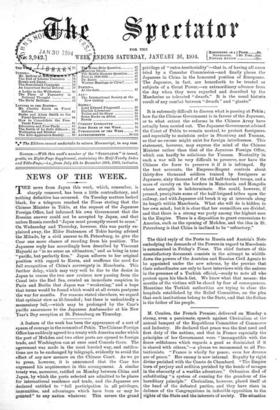It is extremely difficult to discern what is passing at
Pekin ; how far the Chinese Government is in favour of the Japanese, or to what extent the reforms in the Chinese Army have actually been carried out. The Japanese Government' dvised the Court of Pekin to remain neutral, to protect foreigners, and especially to maintain order in Shantung and Yunnan, so that no excuse might exist for foreign interference. This statement, however, may express the mind of the Chinese Minister rather than that of the Japanese Foreign Office, which can hardly be solicitous for Yunnan. Neutrality in such a war will be very difficult to preserve, nor have the Chinese the force to preserve it if it is infringed. By the best accounts, the Empress-Regent controls about thirty-five thousand soldiers trained by foreigners or Japanese, sixty thousand of the old half-trained troops, and a mass of cavalry on the borders in Manchuria and Mongolia whose strength is indeterminate. She could, however, if pressed, precipitate some of the half-brigand tribes upon the railway, and with Japanese aid break it up at intervals along its length within Manchuria. What she will do is hidden in her own mind ; but it is clear that her councillors are divided, and that there is a strong war party among the highest men in the Empire. There is a disposition to grant concessions to America, such as the opening of Mukden, and the idea in St. Petersburg is that China is inclined to be "refractory."










































